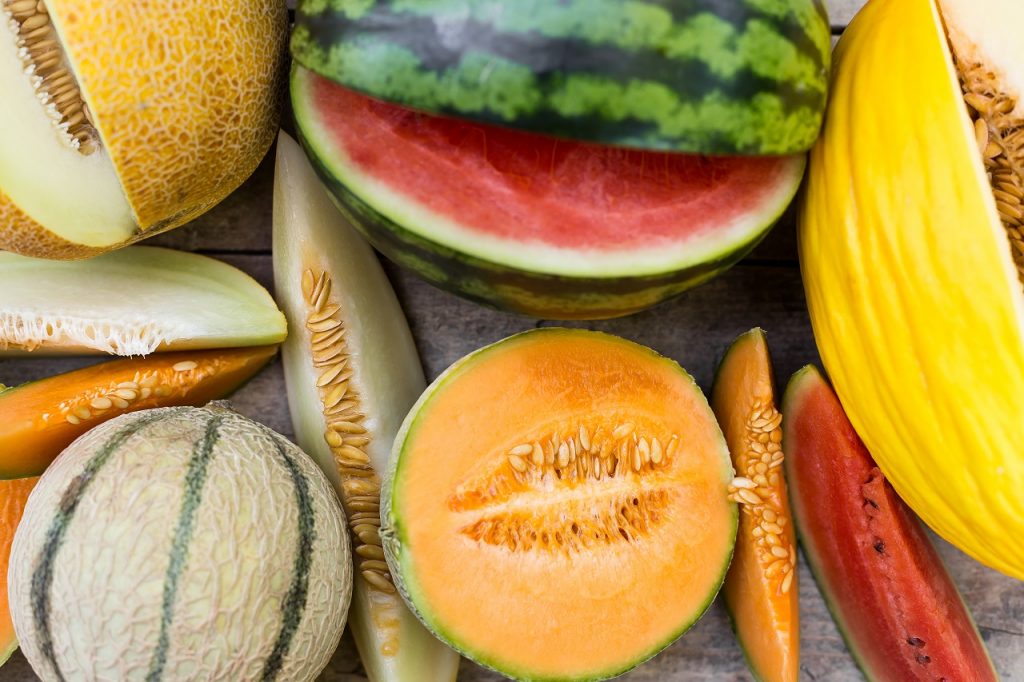 The first fruit that comes to my mind when thinking of summer is Melons. I guess it is because they are quite juicy and nutritious! Melons are a part of the Gourd family that also includes cucumber, squash and pumpkins. There are different types of melons that we find locally. There are a hundred different varieties of them as well. The most common being Watermelon (red and yellow), Cantaloupes (muskmelons), Honeydew and Casaba.
The first fruit that comes to my mind when thinking of summer is Melons. I guess it is because they are quite juicy and nutritious! Melons are a part of the Gourd family that also includes cucumber, squash and pumpkins. There are different types of melons that we find locally. There are a hundred different varieties of them as well. The most common being Watermelon (red and yellow), Cantaloupes (muskmelons), Honeydew and Casaba.
Different Types of Melons & Their Benefits
Melons are consumed as cool, refreshing, healthy snacks on hot summer days. But, it does not end here as they are also packed with nutrients that give us many health benefits. Let’s explore them!
- Watermelon: Most commonly consumed, 92% of this melon is water. They have significant amounts of Vitamins A, C and B6. It is also rich in antioxidants and amino acids. They have good levels of potassium but are low on sodium. Watermelons are known for their high Lycopene content. Lycopene is a phytonutrient found in fruits and vegetables. It is the red pigment that gives red color to tomatoes, guava, etc. Lycopene has been found to be a powerful antioxidant and is anti-inflammatory in nature. Studies have linked Lycopene to heart health, bone health and prostate cancer prevention.
- Cantaloupes (Muskmelon): It’s a summer fruit that’s an excellent source of Vitamin A which helps in maintaining healthy vision and prevents lung and oral cavity cancers. It also has good levels of antioxidant flavonoids like beta-carotene, lutein, zeaxanthin and cryptoxanthin. Antioxidants protect our body from free radical attacks, in turn, protecting our body from diseases like prostate, colon, endometrial, breast, lung and pancreatic cancers. Zea-xanthin protects the eyes from ARMD (Age related macular degeneration), a disease among the geriatric population. Cantaloupes also contain moderate amounts of Vitamin C and B-complex Vitamins like Niacin and Pantothenic acid.
- Honeydew: This fruit is a refreshing treat during hot summers. They are the sweetest among all the melons. Honeydew melons have 90% water content and this makes it a natural diuretic. While they may not be as rich in nutrients as Cantaloupes but, they provide us with substantial amounts of Vitamins and Minerals. Honeydew Melons are an excellent source of Vitamin C, A and Potassium. They also contain good amounts of B-complex Vitamins like B6, Niacin and Pantothenic Acid. Minerals such as Copper, Calcium and Manganese are also present.
- Casaba: Casaba is a mild-sweet melon and tastes like cucumber. It is very low on sugar. Casaba melons are an excellent source of Vitamin C. They also contain good amounts of Vitamin B6. They have fairly good levels of potassium.
All the melons are high volume, low-calorie fruits that provide good satiety due to their fiber and water content, without adding on too many calories in the body. They are a healthy option to satisfy sugar cravings.
As they are mostly made up of water, they are really low on calories:
- 1 cup of Watermelon – 46 calories
- 1 cup of Cantaloupe – 53 calories
- 1 cup of Honeydew – 61 calories
- 1 cup of Casaba – 48 calories
There are many interesting ways in which melons can be consumed. They can be had on their own, cut into cubes or they can be consumed in the form of refreshing cold soups, in fruit yogurts, fruit salads and can be juiced as well. Watermelon seeds are seasoned and eaten as snacks. Watermelon rind is chopped and cooked as vegetable, marinated, pickled or candied.
But, one has to be careful with Melons as they grow in the ground and there are chances of them getting contaminated with waste water. Hence precautions must be taken before cutting them. They must be thoroughly cleansed from the outside and only then cut or else, there are high chances of contaminating the flesh of the melons with pathogens like Salmonella.
Hope this article helps you! For more summer tips, check out Healthy Reads or get this information directly from a certified expert by subscribing for GOQii’s Personalised Health Coaching here.
#BeTheForce



